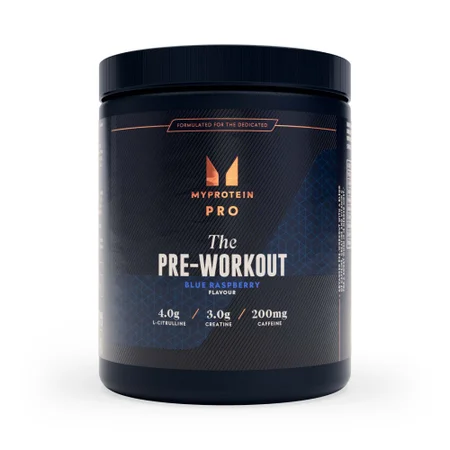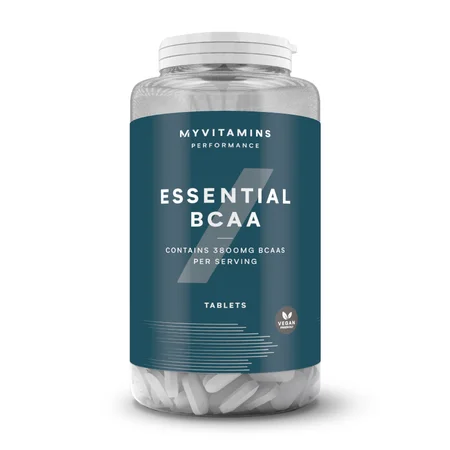
The three branched-chain amino acids are a supplement that have been popular since 1980s, but are they still suitable for people looking to build muscle mass? This article will help bring you up to speed with the current scientific consensus and specify the scenarios in which BCAAs can have the biggest impact.
In this article, you'll find:
What are BCAAs?
How do BCAAs work?
Benefits of BCAAs
When to take BCAAs
Dosage and side effects for BCAAs
What are BCAAs?
Muscle protein is made up of 20 amino acids — 9 essential and 11 non-essential. Essential amino acids can’t be synthesized by the body and need to be included in your diet. Three of the nine essential amino acids are known as branched chain amino acids (BCAA); these are leucine, isoleucine and valine.
Leucine is a particularly important BCAA as it acts a signal that ‘switches on’ muscle protein synthesis.1 BCAAs are found in a variety of high-protein foods and are also available as a supplement in powder or capsule form.
How do BCAAs work?
Eating a meal high in protein and BCAAs will increase your body’s rate of muscle protein synthesis.2 This is important as you need to be in a positive protein balance to gain muscle. In your body, there’s a continuous muscle protein turnover, with periods of increased muscle protein synthesis (MPS) and periods of muscle protein breakdown (MPB).
If your total muscle protein synthesis exceeds muscle protein breakdown you will gain muscle mass. On the flip side, if MPB exceeds MPS, the overall result will be a loss of muscle.
Using a BCAA supplement can help increase your body’s muscle protein synthesis rates3. An increased MPS rate will result in a positive protein balance and subsequently increase the likelihood of muscle gain4.
BCAA Benefits
Due to the impact that the BCAAs have on initiating an increase in MPS rates, BCAA supplements have typically been used to maximise muscle growth. Despite this, the evidence doesn’t support the theory that BCAAs alone can increase muscle hypertrophy.2
The current view in literature is that BCAAs act as a signal and the building blocks of muscle protein synthesis. However, all the essential amino acids need to be present to sustain muscle protein synthesis rates in a way that will build muscle.2
Consequently, consuming a good whey protein supplement, containing all the essential amino acids and rich in BCAAs, is a much better strategy when looking to optimise muscle gain.
Numerous studies have shown that BCAA supplementation has reduced the feeling of muscle soreness following intensive weight training.5,6 Great news to anyone who’s struggled to get up off a chair after a heavy leg day!
However, for improving recovery in a way that will affect muscle performance, the effects of BCAAs seem minimal.5,6 For example, a recent study showed no effect on the performance of vertical jump and jump squat tests despite BCAA supplementation.6
To optimise recovery, hitting the right daily calorie and protein totals seem to be the key factors.7
Although there is a lack of evidence to support the use of BCAAs for muscle growth and recovery, BCAA supplementation will provide a benefit to people in certain circumstances.
One of the biggest benefits of supplementing with BCAA powder is the way in which it will ‘rescue’ a meal that’s low in protein.
Research has shown that adding 5g of leucine to a beverage containing 6.25g whey protein had the same effect on muscle protein synthesis as a beverage containing 25g whey protein.3
This can be really helpful if you’re caught in a situation where your food intake is somewhat out of your control. For example, if you’re faced with a hectic day of meetings at work and the only option is the dreaded sandwich buffet.
Having a backup source of BCAAs on hand can help ensure your low-protein meal will still raise muscle protein synthesis rates.
Not all protein sources contain the same amount of BCAAs. Plant-based protein sources such as wheat, hemp and soy have lower BCAA content than protein sources like dairy, eggs, meat, and fish.8
This is particularly relevant for vegetarians, vegans or anyone struggling to include BCAA-rich protein sources in their diet.
Whilst it’s possible to improve your meal’s amino acid profile by mixing up your protein sources, BCAA supplementation can provide a very simple solution and ensure your vegetarian or vegan meal has the biggest impact on muscle protein synthesis rates.
One of the effects of a high protein diet is the satiety response (feeling of fullness) that protein provides. If you’re struggling to eat enough protein for your health and fitness goals, then supplementing with BCAAs can help ensure that you’re maximising MPS rates despite eating less protein.
Research has also shown that altitude-induced hypoxia will suppress appetite.9 For anyone training at altitude, BCAAs can help fight the effects of a reduced appetite by enhancing the effect of the protein in your meals.
When to take BCAAs
There’s evidence to suggest that there’s a saturation point and that MPS rates will return to baseline regardless of the amount of amino acids ingested at a particular serving.10 So, a good tactic would be to consume BCAAs at regular intervals throughout day, alongside meals that are low in protein and BCAAs.
BCAA Dosage
When taken at meal times, the dose of BCAAs will depend on the amount of BCAAs in the meal. However, as a general guide, 3-5g of BCAA will be sufficient to initiate MPS rates.3 In order to maximise synthesis rates to build muscle, BCAAs should be combined with all the other essential amino acids.
Side Effects
If you’re pregnant or breastfeeding, it’s not recommended that you take BCAAs, as there has not been enough reliable evidence to suggest it is safe to do so.
Take Home Message
Although the evidence shows that ingesting BCAAs without the other essential amino acids isn’t enough to enhance muscle mass, as with most things in the field of sport nutrition, context and relevancy are key.
The current view in the sport nutrition literature is that adding BCAAs to a meal with low protein content will help to maximise your body’s muscle protein synthesis rates.
It could also be of benefit to those who struggle to eat enough protein due to the satiating effect of a high protein diet or altitude induced hypoxia.

Liam is a certified sport nutritionist with the International Society of Sport Nutrition and is enrolled on the British Dietetics Association’s Sport and Exercise Nutrition register. He has a Bachelor’s of Science in Sport and Exercise Science and is graduate of the ISSN Diploma in Applied Sport and Exercise Nutrition.
Liam is an experienced personal trainer, helping clients reach their health and fitness goals with practical, evidence informed exercise and nutrition advice. In his spare time Liam has competed in numerous powerlifting competitions and enjoys hill walking, football and expanding his recipe repertoire in the kitchen.Find out more about Liam's experience here.
- Wilkinson DJ, Hossain T, Hill DS, Phillips BE, Crossland H, Williams J,… Atherton PJ. (2013). Effects of leucine and its metabolite B-hydroxy-β-methylbutyrate on human skeletal muscle protein metabolism. J Physiol 2013. 1;591(11):2911-23
- Jackman SR, Witard OC, Phil A, Wallis GA, Baar K, Tipton KD. (2017). Branched-Chain Amino Acid Ingestion Stimulates Muscle Myofibrillar Protein Synthesis following Resistance Exercise in Humans. Front Physiol. 7;8 :390, 2017
- Churchward-Venne TA1, Breen L, Di Donato DM, Hector AJ, Mitchell CJ, Moore DR, Stellingwerff T, Phillips SM. (2013) Leucine supplementation of a low-protein mixed macronutrient beverage enhances myofibrillar protein synthesis in young men: a double blind, randomized trial. Am J Clin Nutr. 2014 99(2):276-86
- Mitchel CJ, Churchward-Venne TA, Cameron-Smith D, Phillips SM (2015). What is the relationship between the acute muscle protein synthesis response and changes in muscle mass? J Appl Physiol. (2015). 118: 495-497
- Jackman SR, Witard OC, Jeukendrup AE, Tipton KD. (2010) Branched-chain amino acid ingestion can ameliorate soreness from eccentric exercise. Med Sci Sports Exerc. 42(5):962-70, 2010.
- Van Dusseldorp TA, Escobar KA, Johnson KE, Stratton T, Moriarty T, Cole N… Mermier CM. (2018). Effect of branch-chain amino acid supplementation on recovery following acute eccentric exercise. 1;10
- Cinteneo HP, Arent MA, Antonia J, Arent SM. (2018). Effects of protein supplementation on performance and recovery in resistance and endurance training. Front Nutr. 11;5:83
- Gorissen, S. H., Crombag, J. J., Senden, J. M., Waterval, W. H., Bierau, J., Verdijk, L. B., & van Loon, L. J. (2018). Protein content and amino acid composition of commercially available plant-based protein isolates. Amino acids, 50(12), 1685-1695.
- Matu J, Gonzalez JT, Isopoglou T, Duckworth L, Deighton K. (2018). The effects of hypoxia on hunger perceptions, appetite- related hormone concentrations and energy intake: A systematic review and meta-analysis. Appetite (2018). 125:98-108
- Atherton PJ, Etheridge T, Watt PW, Wilkinson D, Selby A, Rankin D…Rennie MJ. (2010). Muscle full effect after oral protein: time-dependent concordance and discordance between muscle protein synthesis and mTORC1 signaling. The American Journal of Clinical Nutrition. 2010. 92(5): 1080-8










